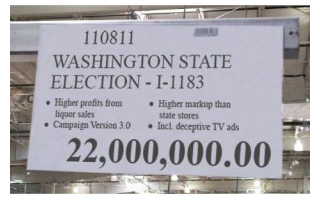Blog
Search
New PAM Report: Post-Privatization in WA
August 27, 2014
A new report from Public Action Management (PAM) details impacts of Washington State I-1183, which handed the state monopoly on spirits and wine sales to private corporations. Costco designed the ballot initiative and spent more than $22 million to make it happen, intent on undermining the three-tier system designed to protect public health and safety. The initiative allows large grocery stores to sell Big Alcohol's products; squeezes the wholesale tier; and cuts out smaller producers and independent retailers.
Conveniently for Costco, I-1183 specified that spirits sales licenses would be limited to large retailers. The Costco campaign for I-1183 promised voters a free market system that would provide greater convenience, lower prices, and increased funding for public safety enforcement. The PAM report describes major outcomes that contradict the campaign's initial promises:
- Spirits prices actually increased, while product variety decreased;
- Availability increased, but small, independent spirits outlets were forced to close, unable to compete with giants like Costco;
- State revenues initially increased due to one-time sales of state-owned liquor stores and special assessments, but will likely decrease over time;
- Rather than a free market, two companies (Costco and Safeway) now control 93% of the WA market;
- $10 million promised for local public safety enforcement never materialized; and
- Reports of theft, particularly by youth, increased substantially.
The report also points out that while it is too soon to make conclusive statements about I-1183's long-term impact on underage drinking, drunk driving, and other public safety concerns, the long-term impact of privatization will likely be averse, as it has in other states that privatized alcohol sales.
Overall, the report concludes that the primary beneficiaries of I-1183 were Costco and other large, national grocery chains, while the public will not likely benefit financially or socially in the long term. With corporate sights set on Oregon and Pennsylvania, voters should listen and learn from Washington, and the privatization promises broken in that state.
Help us hold Big Alcohol accountable for the harm its products cause.
| GET ACTION ALERTS AND eNEWS |
STAY CONNECTED    |
CONTACT US 24 Belvedere St. San Rafael, CA 94901 415-456-5692 |
SUPPORT US Terms of Service & Privacy Policy |
Copyright © 2024 Alcohol Justice. All Rights Reserved.
Joomla! is Free Software released under the GNU General Public License.


